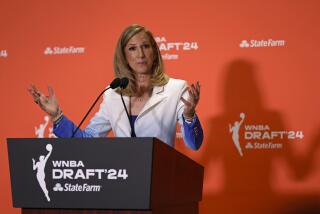Entering 11th season, WNBA still considered a niche league
The WNBA starts its 11th season this weekend, a cause for celebration among women sports advocates even as the league’s attendance keeps sinking. To them, just surviving that long is reason enough to break out the champagne.
Another 10 years from now it’s likely the WNBA will still be around. NBA commissioner David Stern will make sure of it by using profits from the men’s game to subsidize the league as long as needed.
The game itself, proponents will tell you, has vastly improved even as teams struggle to draw fans. I’ll have to take their word for it, because in 10 years I’ve never felt the desire or need to see one in person.
Apparently, there are a lot of people like me. Attendance dropped to about 7,500 a game last year, the team in Charlotte folded, and the championship game had to be moved to another arena because of a Mariah Carey concert.
It’s not that we’re all male chauvinists when it comes to sports. I enjoy watching Serena Williams hit a tennis ball, and I pay attention to women’s golf. I’ll be rooting for Danica Patrick to win the Indianapolis 500.
Besides, the problem isn’t just that men don’t follow women’s sports. Women don’t watch, either, and that’s the biggest reason the WNBA struggles, the WUSA folded and the LPGA barely registers on the sports marketplace.
The truth is, women would rather watch men play sports than watch their own gender -- and by a large margin.
A survey three years ago by New York-based Scarborough Research showed that three times as many women were loyal followers of the NBA than they were the WNBA; five times as many women were major league baseball fans than they were LPGA fans; and women watched the NFL more than anything else.
It’s been 35 years since Title IX opened sports opportunities to women in college, which means two generations have taken advantage of increased scholarships. But while more women play sports, that doesn’t automatically guarantee there will be audience to watch them.
That was part of the discussion a few weeks ago when a meeting of the U.S. Commission on Civil Rights turned into a heated debate over the future of Title IX and whether women were all that interested in sports.
“There are a lot of little girls out there that want to play, but there are a lot of little girls that don’t,” commissioner Jennifer Braceras said. “There are still very many girls that don’t want to play. The law can’t change that. You can’t force people to do something they don’t want to do.”
You can’t force them to watch, either.
When Title IX was enacted back in the 1970s, Billie Jean King, Chris Evert and Peggy Fleming were the biggest women stars. The argument could be made today that no woman since has matched their ability to get people to watch despite the increased opportunities.
Actually, the most popular female athlete of her time barely registers today. That would be Gertrude Ederle, who thrilled the nation when she became the first woman to swim the English Channel in 1926, and was given a ticker-tape parade that drew millions.
Wonder who is the most popular female athlete today? The answer is both surprising and telling.
The people at Marketing Evaluations Inc., which has compiled its Q-score familiarity ratings for more than 40 years, asked sports fans in March who their favorite athletes were.
Michael Jordan topped the list as usual, followed by Tiger Woods. The first female ranked No. 22, just behind Larry Bird.
Her name? Kristi Yamaguchi.
Yes, Kristi Yamaguchi. She won a gold medal in figure skating in 1992, then toured with “Stars on Ice.” More recently she was skating in her own “Friends and Family” ice show.
All fine accomplishments, but she hasn’t competed in 15 years.
Three of the top five women in the sports Q ratings are retired figure skaters, which by itself should tell you something about the state of women’s sports. The top active player was Serena Williams at No. 50, followed a few spots later by softball player Jennie Finch.
And for all the hype over the 1999 women’s World Cup and its promise to transform women’s sports in the United States, Mia Hamm is the only player from that team to crack the top 100.
My guess is that Laila Ali may surpass them all in the next survey, not because of her boxing skills but because of her name and the fact she has become a hit on “Dancing With The Stars.”
The WNBA has had a decade to prove itself but remains a niche sport, the women’s pro soccer league is no longer around, and the LPGA has to buy its own time if it wants to be on network television.
Yes, this is a big weekend if you’re a WNBA fan. The league opens its second decade with five games, including a game between Sacramento and Detroit that will be televised on ABC, and opening game crowds should be respectable.
They might even get a few highlights on ESPN if Arena Football doesn’t hog them all.
But until women fans become fans of women sports, this may be as good as it gets.
More to Read
Go beyond the scoreboard
Get the latest on L.A.'s teams in the daily Sports Report newsletter.
You may occasionally receive promotional content from the Los Angeles Times.










